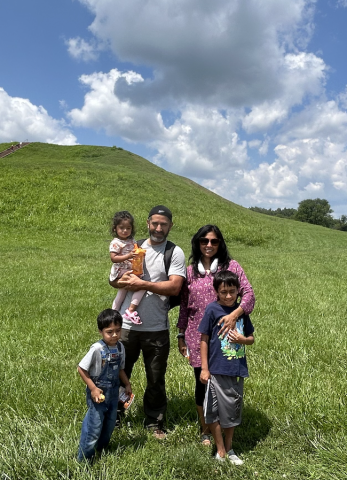
The Child Care Crisis and the Climate Crisis : A Perfect Storm for Families & Providers
Recently we’ve seen the harrowing devastation of Hurricane Helene across six states with fatalities and destruction in North Carolina, South Carolina, Georgia, Florida, Tennessee and Virginia and are witnessing in real-time communities in Florida bracing themselves for the potentially catastrophic impact of Hurricane Milton. My heart is heavy thinking about all the loss and ongoing devastation. Disasters like this can seem so sudden and unpredictable, with people left at the mercy of nature. However, the truth is that much of the rapidly worsening catastrophic weather events attributed to climate change are directly caused by human-activity. And despite data showing that climate change disproportionately harms children, the effect of climate change on families and on the areas that impact them, like child care, have been largely missing from the conversation.
Share your experiences with climate change and child care now!
When schools and child care centers shut down, roads close, homes are damaged or destroyed and families are left devastated and traumatized, what care and support do children receive during these most vulnerable of moments? In North Carolina, at least 19 Head Start centers have been wiped out, child care providers there don’t know if they can return to work, and families are faced with uncertainty regarding so many things, including child care, as they grapple with the aftereffects and often life-changing impact of disaster. The U.S. already has a severe lack of child care and these worsening disasters are only throwing our care system into further crisis. The truth is that climate crisis combined with our nation’s ongoing child care crisis only equals further disaster for families and providers. Putting the weight of children and babies’ worsening physical, mental and emotional health outcomes due to climate change on the backs of our overburdened child care system, while offering no support is unconscionable, and sets up both providers and our youngest learners for unnecessary hardship. On top of all this, due to lack of funding, child care providers are not even close to being equipped with the physical infrastructure needed to mitigate the effects of soaring temperatures, polluted water supplies, and worsening air quality on the children they provide care for and on their child care facilities.
At this point almost every family and every mom likely has their own story when it comes to climate change’s impact on their lives. I certainly do. Last year my eight year old son’s school was evacuated because of the wildfires in Quebec. I could literally smell burning wood inside my home with my windows and doors closed even though I live hundreds of miles away in New Jersey. My son’s entire elementary school was bussed to our local middle school because his school, being older, did not have sufficient updated HVAC systems needed to keep students safe. Unfortunately his school was not alone in this (though thankfully their HVAC has been updated since then), according to the Center for American Progress’s recent report “Protecting Children From Extreme Heat Is Critical for Their Health, Learning, and Development”, an estimated 36,000 schools nationwide are without adequate HVAC systems.
Experiences with climate change is unfortunately not a one time event. It’s a new “normal” that is pervasive and ongoing. Just this past July, my family and I had to go without clean water to drink or bathe in for a week during a heatwave because extreme heat made the water system in my local area unsafe. Increasing heat can wreak havoc on water supplies, from causing an excess of algae blooms, explosions in numbers of water-borne pathogens, and increases in the decomposition of organic matter that can pollute water supplies. Not being able to bathe three little kids and boiling pots and pots of water non-stop in the middle of a heatwave while working full time AND being sole provider of child care for all three of my kids due to my family’s inability to afford summer child care or camp was the melted icing on top of a hot mess summer cake.
Stories and circumstances like mine are becoming frighteningly routine as recent data raises the alarm on how exactly climate change increasingly harms children. Kids (especially younger kids and babies) are uniquely vulnerable to environmental hazards, compared to adults, with negative impacts being greatest in communities of color and especially for Black families and children. Studies show extreme heat disrupts early development and increases a child’s risk for short- and long-term health conditions, slows cognitive functioning and hurts sleep quality in children. Neighborhoods with the highest temperatures have the most polluted air and the highest rates of childhood asthma, with children of color being 20-27% more likely than white children to currently live in areas with the highest projected increases in childhood asthma diagnoses. Kids are particularly vulnerable to poor air quality due to their still-developing lungs taking in twice as many breaths per minute than adults, thereby causing harm to lung function, worsening asthma and increasing visits to pediatric emergency departments nationwide. Inflammation from air pollution in early childhood has also been linked to negative impacts on early cognitive development and an escalation in mental illness in teens and adults.
The most troubling aspect of climate change is that it is only getting worse. Last year was shown to be the hottest year on record, according to analysis by the National Oceanic and Atmospheric Administration. Average global temperatures in 2023 were 2.12 degrees higher than the average temperature of the last century — and higher than any other year since records began in 1850. In fact, the ten warmest years on record have all been in the past decade!
Families and children need decision makers to take action and address climate change. Known solutions preventing utter catastrophe are not being implemented at the levels needed by governments (including our own) and corporations who are largely and disproportionately responsible for the onset of climate change during our times. The price of inaction is too steep of a cost for our families and communities to pay, and as we’ve seen in North Carolina, a lack of attention and movement on this issue till disaster hits only leads to further devastation and loss. But together we can raise awareness and our voices by sharing our own experiences to push for policy and legislative solutions addressing the double crisis of climate and care.
This is why it’s so important to hear from you on your climate change story! Share your climate change experience with us today to be part of a movement lifting our collective voices on why addressing climate disaster is critical for the survival and wellbeing of our children and families. Climate change is disrupting our ability to work and find care, and moms need to be heard! Data and statistics on this issue are very important, but numbers don’t fully illustrate the very real and personal impacts climate change has on families around the country each and every day like your stories do!
Inaction is no longer an option, literally everything hinges upon whether or not we can come together to save our planet and its people. Though policies and rhetoric may have so far relegated climate change to mostly environmental concerns, the truth is that it is impacting families, costing lives, harming the health of entire communities and especially hurting those we are responsible for protecting, our children. We can and must do more.



The views and opinions expressed in this post are those of the author(s) and do not necessarily reflect those of MomsRising.org.
MomsRising.org strongly encourages our readers to post comments in response to blog posts. We value diversity of opinions and perspectives. Our goals for this space are to be educational, thought-provoking, and respectful. So we actively moderate comments and we reserve the right to edit or remove comments that undermine these goals. Thanks!